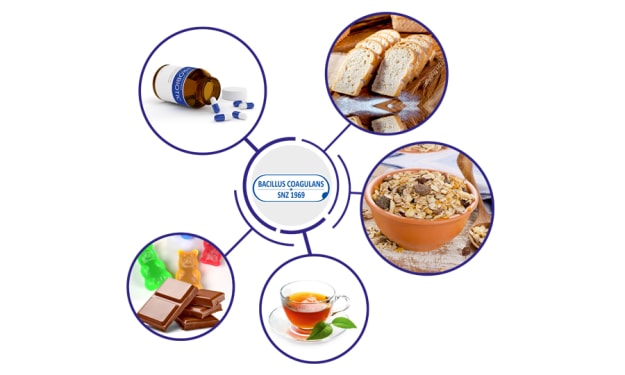Which Bacillus Probiotic is a Good Bacteria?
Sanzyme Biologics

For ages, spore-forming bacilli have been studied for food production and preservation. Bacilli are important in the food chain because of their ability to produce a vast range of secretory proteins, enzymes, antibacterial chemicals, vitamins, and carotenoids. Because of their enhanced tolerance and survivability in the gastrointestinal tract's adverse environment, Bacillus spp. are also gaining interest in human health-related functional food research. Bacilli are also sturdy during food and pharmaceutical preparation processing and storage, making them ideal for health-promoting formulations.
Bacillus strains also have biotherapeutic promise because of their capacity to interact with the host's internal environment by generating antimicrobial peptides and tiny extracellular effector molecules. Despite the proposed scientific evidence, commercial probiotic supplements and functional foods containing Bacillus spp. have not gained much traction among the general public, because of the debate over the probiotic vs. pathogen tag of Bacillus in the research and production arenas is perplexing consumers.
To obtain a consensus, it's crucial to comprehend the phenotypic and genotypic properties of selectively beneficial Bacillus spp., as well as their substantiation with those with GRAS status.
Niche and Availability of Bacillus Probiotics
Bacillus is a Gram-positive, rod-shaped, spore-forming bacteria that can be aerobic or facultatively anaerobic. Bacillus is classified as a genus of soil dwellers in general. Bacillus spp. can be isolated from a variety of sources, including air, water, human and animal guts, as well as vegetables and food, according to frontiersin.org.
Bacillus spp., on the other hand, is the most diverse group in terms of phenotypic and genotypic characteristics. In humans and animals, certain organisms have been identified as opportunistic pathogens or toxin producers. Lactobacillus spp., the well-known potential probiotic, belongs to the Bacillus genus. Both belong to the Bacilli class of the Firmicutes phylum.
In the case of probiotics, it is recommended that the candidate probiotic be isolated from the gut of the target population since this allows them to thrive in the gut. However, for spore-former survival, basic characteristics of native flora are not required.
Bacillus spores can withstand high acidity in the stomach, as well as bile salts and other GIT irritants. Bacilli are also more stable during food and pharmaceutical preparation processing and storage, making them a better constituent for health-promoting compositions.
According to frontiersin.org, Bacillus strains with probiotic properties are isolated from fermented or unfermented food sources and commercialized in the form of a varied spectrum of health supplements, in addition to human sources.
Spore-Formers in Human Gut
Bacillus spp. Is not presumed to be a natural stomach dweller. After eating vegetables or raw food products infected with soil microorganisms, they colonize the intestinal tract. In addition, fermented cereals or beans, such as Iru and Natto, are absorbed through the intestine.
In vitro investigations show that B. cereus vegetative cells and spores can effectively protect against GIT stress and attach to the intestinal epithelium. The commensal gut microbiota, on the other hand, has inhibitory activity against them.
Probiotic Bacillus Coagulans is considered the best bacteria. Bacillus coagulans is a probiotic or beneficial bacteria. It makes lactic acid, but it's not the same as Lactobacillus, a different type of probiotic. During its reproductive life cycle, B. coagulans can produce spores.
Bacillus subtilis SNZ 1972 is originally named Vibrio subtilis by Christian Gottfried Ehrenberg which was later renamed as Bacillus subtilis by Ferdinand Cohn in 1872. This bacterium is also known by many names like hay bacillus, grass bacillus, or Bacillus globigii. It is also widely used for safe, well-documented, and stable spore-forming bacteria that promote gastrointestinal health.
Sporlac Probiotic Medicine
When soldiers used to fall sick during war, the discovery and use of Sporlac probiotic medicine have given several health benefits. Lactobacillus strains have even helped in controlling loose bowels and constipation when needed. Lactobacillus, also known as SPORLAC, still stands as one of the most trusted probiotics.
Probiotic in medicines: Sporlac probiotic medicine
Around 1964, when soldiers were falling sick, the discovery of this strain showed potential health benefits. The benefits of this Lactobacillus strain against loose bowels and constipation were proved that year, and after 3 decades, Lactobacillus, also known as SPORLAC, still stands as one of the most trusted probiotics to date.
Bacillus Clausii is found in health food products such as granola bars, chocolates, and candies as a dietary supplement. Buy Bacillus Clausii in the form of sachets, tablets, capsules, and powders at any nearby drugstore. It's also used in the poultry, aquaculture, swine, and other vet segments as a feed supplement.
About the Creator
Sanzyme Biologics
Sanzyme Biologics is India’s pioneer Biotechnology company and first probiotic manufacturer. We offer various supplements on probiotics, vitamins, and enzymes.






Comments
There are no comments for this story
Be the first to respond and start the conversation.